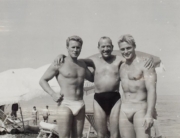More than a few filmmakers have recently been moved to make films set in the repressive Communist regimes following World War II. Two of them have done so to incredible effect: Ivan Ostrochovsky’s Servants depicted a seminary in the Czechoslovakia of the 1980s, and the result was a nightmarish and poignant study of ethics and loyalty; Sebastian Meise set Great Freedom in a West German penitentiary over several decades and focused on those who have been imprisoned for homosexual activity. It’s one of the more emotionally arresting dramas of recent years.
Based on a true story, Firebird, directed by Peeter Rebane, has similar subject matter to the previously mentioned films. Set in 1970s Soviet-era Estonia at the Haapsalu Air Force Base, it too involves a homosexual affair at a time when such activity could destroy someone’s reputation. Sergey (Tom Prior, who co-wrote and co-produced) is a young soldier who loves photography, takes nighttime swims with his friends, and, provided no higher-up is listening, makes jokes about Stalin. A colleague, Luisa (Diana Pozharskaya), seems to have eyes for him, and is surprised that he does not intend to remain in the military, while another friend, Volodja (Jake Thomas Henderson), encourages Sergey to make a move on Luisa.
When a handsome lieutenant (Oleg Zagorodnii) named Roman arrives at the base, he attracts the attention of both Sergey and Luisa. In the last few weeks of his service, Sergey is assigned to show Roman around, and the attraction between them is clear from the outset. They discover they both love photography, and in one charged sequence, Roman teaches Sergey to develop photographs, their hands touching in the sparsely lit room. They discover a mutual love for theater and attend a rehearsal of the Firebird ballet. Before long, their affair has begun, one that threatens Roman’s standing if it is ever discovered.
Though one is never confused about what is at stake in this film—Soviet officials make perfunctory threats toward Roman as soon as the affair is discovered; a nasty drill sergeant browbeats a young soldier—its tone is oddly sunny. Military service doesn’t seem so bad in this Estonian outpost. The young soldiers play guitar, flirt, tell jokes, go on nighttime swims, and while authority is never far away, the impression is more that they are at a somewhat lax boarding school. As much as Sergey and Roman yearn for what the repressive regime denies them, they seem to be pretty good at staying cheerful, and they go about their affair as though they are surprised to discover that risks exist in the first place.
In other words, it is not easy to take this film seriously as a piece of realism, which seems to be what it is aiming for. Yet, in a sense, I respect the intention to emphasize the small joys people make for themselves in difficult circumstances, even if the portrayal does not fully convince. However, much of the film’s dialogue comes about in embarrassing platitudes, and sometimes the acting is equally unbelievable. One of the chief arguments involves Sergey lashing out at Roman for refusing to be himself, and in this case, neither the words nor their delivery comes across as anything more than trite. Everything, in the acting and the script, stays pretty much on the surface. When set against Servants and Great Freedom, Firebird serves to remind us that totalitarian regimes demand a more rigorous treatment when portrayed on screen.







Leave A Comment